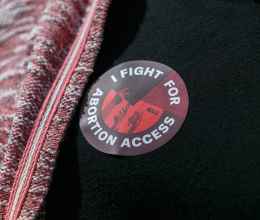Many of us are still reeling from the Supreme Court’s 5-4 ruling on Burwell v. Hobby Lobby. The decision, delivered on Monday, concluded that closely held for-profit corporations do not have to comply with the contraceptive mandate portion of the Affordable Care Act. Closely held corporations are, generally, corporations that have more than 50% of their outstanding stock owned by five or fewer individuals at any time during the last half of the tax year. The majority opinion in the decision states that complying with the contraceptive mandate stands in violation of the Religious Freedom Restoration Act (RFRA), a federal law that states that the government cannot pass laws that substantially burden the practice of religion. In her dissent, Justice Ginsberg called the ruling “a decision of startling breadth.” For a thorough explanation of the ruling, read Rachael’s blog about Monday’s decision.
It is troubling that the Court has now given employers the right to decide – based on the employers’ religious beliefs – whether to include coverage for contraceptives in their employees’ health plans. On the surface, this decision clearly favors the rights of a corporation over a female employee. The decision also disregards the lives of low-income women and their families. Contraceptives are not “special care," contraceptives are an important part of women’s health care. Large numbers of women use contraception as family planning. Roughly 62% of all women of reproductive age are currently using a contraceptive method. Of that number, 64% are using temporary methods such as IUDs, condoms, and hormonal methods. In 2010, of the 37 million women in need of contraceptive care, 14.3 million were in need of publicly funded services and supplies either because their incomes were below the poverty level.
While the decision applies to all 20 federally approved forms of contraceptives, the plaintiffs in the cases took particular issue with two particular forms: “morning after pills” and intrauterine devices (IUDs). IUDs are more effective and efficient than other pill form contraceptives. They are, consequently, more expensive. The average cost of an IUD is approximately a month’s pay for workers earning minimum wage. The cost for the device, the office visit, and the insertion can total more than $1,000. Even with private insurance, many women still incur out-of-pocket costs for IUDs. When confronted with those costs, women who cannot afford the procedure opt for other, less reliable methods of family planning. In instances where the out-of-pocket costs for IUDs were eliminated, women were twice more likely to choose this more effective and longer-lasting birth control method. Access to effective birth control methods is crucial for low-income women. Family planning allows women to better take care of the children they already have. Family planning allows a woman to plan for her future. It allows women to take control of their bodies, giving them the chance to lead self-directed lives.
Although the Court has given some bosses (i.e., Hobby Lobby and Conestoga Wood) the right to take away contraception coverage from their employees, the contraception rule will continue to provide millions of women with crucial access to contraception without co-pay. Here in Maine, we don't expect to feel the effects of this ruling. Maine passed a law in 1999 that requires insurance providers to include contraception coverage if their plans include prescription or outpatient care. The Burwell v. Hobby Lobby case was decided under the federal RFRA – a federal statute that weighs federal laws (like the ACA). The decision shouldn’t have bearing on our state law. The Portland Press Herald recently published an article explaining why this ruling should not affect Maine. Our legal director, Zach Heiden is quoted in the article. You can read that article here.









